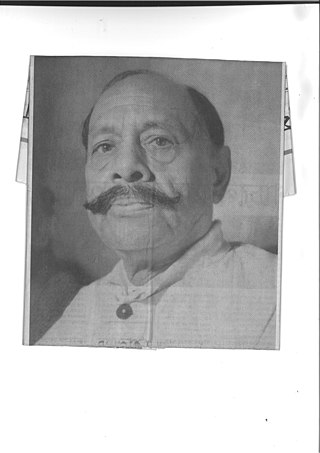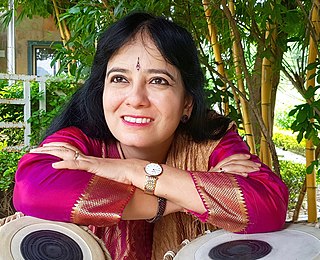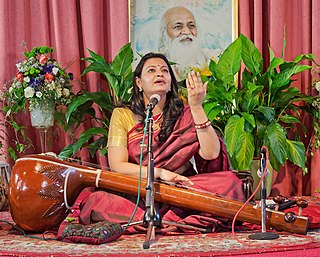In Hindustani music, a gharānā is a system of social organisation in the Indian subcontinent, linking musicians or dancers by lineage or apprenticeship, and more importantly by adherence to a particular musical style.

Rai Chand Boral was an Indian composer, considered by music connoisseurs to be the Bhishma Pitamah, the father of film music in India.
Paṅjāb Gharānā, is a style and technique of tabla playing that originated in the Punjab region of the Indian subcontinent, now split between present-day Pakistan and India. The Punjab Gharana is considered one of the six main styles of tabla, the others being Delhi, Ajrada, Banares, Lucknow, and Farrukhabad. The repertoire of the Punjab Gharana is heavily influenced by the Pakhawaj.

Ustad Faiyaz Khan was an Indian classical vocalist, an exponent of the Agra gharana of Hindustani classical music.
Pandit Sankha Chatterjee is an Indian tabla player. He studied under three traditional Tabla Gharana in strict Parampara tradition.
Ustad Ahmed Jan Khan "Thirakwa" was an Indian tabla player, commonly considered the pre-eminent soloist among tabla players of the 20th century, and among the most influential percussionists in the history of Indian Classical Music.
The Lucknow Gharānā, also known as "Purab Gharâna" for tabla, is a discipleship tradition ("gharana") with a tabla legacy and Kathak legacy. These two traditions are known for being one of the six major gharanas of tabla and three gharanas of kathak.

A tabla is a pair of hand drums from the Indian subcontinent. Since the 18th century, it has been the principal percussion instrument in Hindustani classical music, where it may be played solo, as an accompaniment with other instruments and vocals, or as a part of larger ensembles. It is frequently played in popular and folk music performances in India, Bangladesh, Afghanistan, Pakistan, Nepal and Sri Lanka. The tabla is an essential instrument in the bhakti devotional traditions of Hinduism and Sikhism, such as during bhajan and kirtan singing. It is one of the main qawwali instruments used by Sufi musicians. The instrument is also featured in dance performances such as Kathak. Tabla is a rhythmic instrument.
Farrukhabad Gharana is one of six prominent playing styles or gharanas of North Indian tabla, in Hindustani classical music, and derives its name from Farrukhabad in Uttar Pradesh.
Sumati Mutatkar was an Indian classical music vocalist and musicologist from the Agra gharana of Hindustani classical music, and a Professor of Department of Music in University of Delhi.

Anuradha Pal is a Tabla virtuoso, multi-percussionist and music composer who is acclaimed as the first professional female tabla player in the world by Encyclopedia Britannica and the Limca Book of Records.

Pandit Anindo Chatterjee is an Indian tabla player of the Farrukhabad gharana school. He was born into a musical family. Chatterjee is a disciple of Pandit Jnan Prakash Ghosh.
Phuljhuri Khan was a tabla and esraj player from Bangladesh. He was also an accomplished sanai, sitar, and pakhawaj player.
Ramchandra Purushottam Marathe, also known as Pandit Ram Marathe, was a Marathi music director, singer, and actor on stage and in films. As a child actor, he performed the title role of Krishna in Prabhat Film Company's 1938 film, Gopal Krishna. He was disciple of Vilayat Hussain Khan, the maestro of Agra gharana of Hindustani classical music., Master Krishnarao Phulambrikar and others. Through Master krishnarao, he developed his Khayal style which had elements of different gharanas such as Jaipur, Gwalior and Agra.

Pandit Santosh Joshi is an Indian vocalist in the Hindustani classical tradition. He is a member of the Joshi Gharana, a branch of the Lucknow tabla gharana. He is known for the khayal form of singing, as well as for his popular renditions of devotional bhajans and Hori. He is the most recent recipient of the Rajiv Ratna Award of Bikaner.

Shanno Khurana is a noted Indian classical vocalist and composer, from the Rampur-Sahaswan gharana of Hindustani classical music. A disciple of the doyen of the gharana, Ustad Mushtaq Hussain Khan, she is known for performing rare bandish and raag, though her singing style includes genres like khayal, tarana, thumri, dadra, tappa, to chaiti and bhajan. Born and brought up in Jodhpur, she started singing on All India Radio in 1945 in Lahore, later shifted to Delhi, where she continued her singing on All India Radio, Delhi and in concerts and music festivals. She also pursued music education, finally earning her M.Phil. and PhD in music from the Kairagarh University, and has undertakes extensive research on folk music of Rajasthan.
Madhukar Dhumal is an Indian Shehnai Player, Composer and freelance Musician. He is a disciple of Guni Gandharva Pandit Laxmanprasad Jaipurwale and Pandit Rajaram Sukhla.He is part of many other bands and has performed with various artists around the world. Majorly performed for Bollywood industry with all known Music directors.

Pandit Ramdas Palsule is a Tabla virtuoso from Pune, India. He is also an A grade artist of All India Radio and Doordarshan.

Meeta Pandit is a Hindustani Classical vocalist and a leading exponent of the Gwalior Gharana. She is the granddaughter and disciple of Krishnarao Shankar Pandit and daughter of Laxman Krishnarao Pandit. She is the sixth in the unbroken lineage and the first woman in the family to have taken up music as a profession.
Kankana Banerjee is an Indian Classical singer who trained under the tutelage of Indian classical vocalist Ustad Amir Khan in Lucknow. She has received several accolades and awards for her contribution to Hindustani classical music, including the State Government of Andhra Pradesh felicitation "Andhra Ratna Award " presented by Mother Teresa in 1987.









